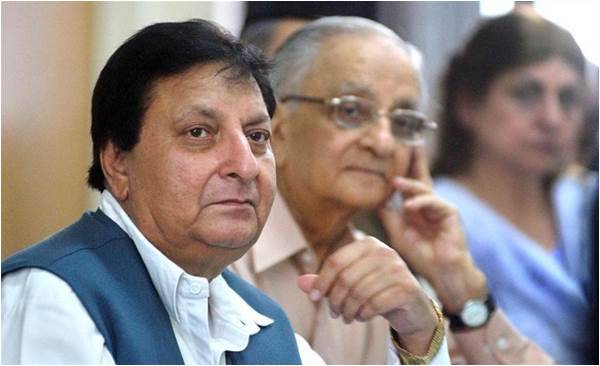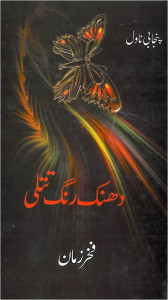
Fakhar Zaman’s is among the most potent voices in post-modern Punjabi literature. Perhaps he is the only major writer who is read across the border without prejudice or prejudgment. It is his distinction to be able to talk in a dialect which is easily understood by residents of both the Punjabs who can also empathize with his simple, artless themes, devoid of any political savvy. Fakhar is a tender but powerful storyteller, the natural manner of whose art seems to have touched new heights with each successive work, whether in prose or verse.
 The pathos in his work is set in the realm of a political no-man’s-land. It is, in short, the unending tale of an eternal, fateful combat between the forces of darkness and the messianic figure of a revolutionary and charismatic martyr, ruthlessly extinguished in his prime. Having said that, it is noteworthy that his political belief system does not metamorphose into the political propaganda of a turn-of-the-century socialist doctrinaire. Nor does it masquerade as the ranting of a latter-day rabble-rousing party ideologue. His wordsmith’s art encompasses everything of note.
The pathos in his work is set in the realm of a political no-man’s-land. It is, in short, the unending tale of an eternal, fateful combat between the forces of darkness and the messianic figure of a revolutionary and charismatic martyr, ruthlessly extinguished in his prime. Having said that, it is noteworthy that his political belief system does not metamorphose into the political propaganda of a turn-of-the-century socialist doctrinaire. Nor does it masquerade as the ranting of a latter-day rabble-rousing party ideologue. His wordsmith’s art encompasses everything of note.
Fakhar Zaman’s experiment with a new technique in the case of Dhanak Rang Titli (The Rainbow-Coloured Butterfly) deserves to be taken seriously. It is in the style of James Joyce’s Ulysses, or The Portrait of the Artist as a Young Man. That should suffice as a reference because clearly the audience and the narrative in the case of Joyce’s novels is completely different, besides having a time gap of a hundred odd years. He weaves together quotes from Waris Shah and Bulley Shah; Shah Hussain, Sultan Bahu, Mian Muhammad and Khwaja Farid to make his point; to great effect. Then he harks back to another wellspring of his intellectual inspiration: namely, 20th century intellectual giants like Pablo Neruda, Frank Fanon, Andre Malraux, et al. in order to complete the mosaic.
The plan of the novel has been arranged by the author in the form of a step by step journey through a pathway of colours, like a prism in which the wisdom of the ages, drawn both from the East and the West has been interwoven seamlessly.
For the most part though, it reads like a monologue, perhaps like one’s innermost self hurled about and taken apart as a result of a most intense introspection. The butterfly is the symbolic representation of the march of history. It flits across cataclysmic events through the ages of man in a nonchalant manner: no cultural hiccups interrupting its penetrating, ruthless probing.
A singular success of the author is not to let tragedy sink into triviality but rather to maintain its dignity. The old man of the novel is symbolic of a decadent and tottering state, confused about his purpose as well as his past. A pointed reference to his age - 65 or 66 - brings the metaphor full circle. It is nothing but the symbolization of our own dear homeland. The message, therefore, is loud and clear. The old man/nation state should come out of its reverie of self pity, clear the cobwebs of its confusion, and take its rightful place in the comity of nations. The old man and the butterfly are at peace towards the end of the story, which is good news for the peace of mind of the faithful.
Dhanak… should rank as the apogee of Fakhar Zaman’s oeuvre. With more than a dozen literary works at his credit, Fakhar can rightly claim to be the front man of letters among contemporary Pakistani authors. Among his fellow writers, there are, no doubt, some highly respected writers of fiction and poetry. However, he is by no means in competition with anyone in the Punjabi darbaar for his place in the modern and post-modern Punjabi. He has already carved a niche for himself among the major writers of this great language. Few among the living Punjabi authors have read through classical as well as modern literature in various languages as extensively as him. Besides, his political schooling and the rough and tumble of politics have honed his artist’s skills to a remarkable degree.
Dhanak… is truly a tour de force in contemporary Punjabi novel. It is the mirror of a journey from renunciation to redemption. As for Fakhar, you may love his work or loathe it, but you may not be able to dismiss it, which, perhaps, is the true test of a great mind.
 The pathos in his work is set in the realm of a political no-man’s-land. It is, in short, the unending tale of an eternal, fateful combat between the forces of darkness and the messianic figure of a revolutionary and charismatic martyr, ruthlessly extinguished in his prime. Having said that, it is noteworthy that his political belief system does not metamorphose into the political propaganda of a turn-of-the-century socialist doctrinaire. Nor does it masquerade as the ranting of a latter-day rabble-rousing party ideologue. His wordsmith’s art encompasses everything of note.
The pathos in his work is set in the realm of a political no-man’s-land. It is, in short, the unending tale of an eternal, fateful combat between the forces of darkness and the messianic figure of a revolutionary and charismatic martyr, ruthlessly extinguished in his prime. Having said that, it is noteworthy that his political belief system does not metamorphose into the political propaganda of a turn-of-the-century socialist doctrinaire. Nor does it masquerade as the ranting of a latter-day rabble-rousing party ideologue. His wordsmith’s art encompasses everything of note.Fakhar Zaman’s experiment with a new technique in the case of Dhanak Rang Titli (The Rainbow-Coloured Butterfly) deserves to be taken seriously. It is in the style of James Joyce’s Ulysses, or The Portrait of the Artist as a Young Man. That should suffice as a reference because clearly the audience and the narrative in the case of Joyce’s novels is completely different, besides having a time gap of a hundred odd years. He weaves together quotes from Waris Shah and Bulley Shah; Shah Hussain, Sultan Bahu, Mian Muhammad and Khwaja Farid to make his point; to great effect. Then he harks back to another wellspring of his intellectual inspiration: namely, 20th century intellectual giants like Pablo Neruda, Frank Fanon, Andre Malraux, et al. in order to complete the mosaic.
The plan of the novel has been arranged by the author in the form of a step by step journey through a pathway of colours, like a prism in which the wisdom of the ages, drawn both from the East and the West has been interwoven seamlessly.
For the most part though, it reads like a monologue, perhaps like one’s innermost self hurled about and taken apart as a result of a most intense introspection. The butterfly is the symbolic representation of the march of history. It flits across cataclysmic events through the ages of man in a nonchalant manner: no cultural hiccups interrupting its penetrating, ruthless probing.
A singular success of the author is not to let tragedy sink into triviality but rather to maintain its dignity. The old man of the novel is symbolic of a decadent and tottering state, confused about his purpose as well as his past. A pointed reference to his age - 65 or 66 - brings the metaphor full circle. It is nothing but the symbolization of our own dear homeland. The message, therefore, is loud and clear. The old man/nation state should come out of its reverie of self pity, clear the cobwebs of its confusion, and take its rightful place in the comity of nations. The old man and the butterfly are at peace towards the end of the story, which is good news for the peace of mind of the faithful.
Dhanak… should rank as the apogee of Fakhar Zaman’s oeuvre. With more than a dozen literary works at his credit, Fakhar can rightly claim to be the front man of letters among contemporary Pakistani authors. Among his fellow writers, there are, no doubt, some highly respected writers of fiction and poetry. However, he is by no means in competition with anyone in the Punjabi darbaar for his place in the modern and post-modern Punjabi. He has already carved a niche for himself among the major writers of this great language. Few among the living Punjabi authors have read through classical as well as modern literature in various languages as extensively as him. Besides, his political schooling and the rough and tumble of politics have honed his artist’s skills to a remarkable degree.
Dhanak… is truly a tour de force in contemporary Punjabi novel. It is the mirror of a journey from renunciation to redemption. As for Fakhar, you may love his work or loathe it, but you may not be able to dismiss it, which, perhaps, is the true test of a great mind.

